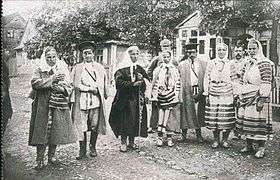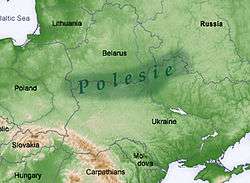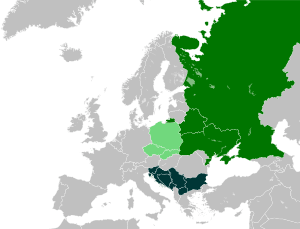Poleshuks
Poleshuks[1] (Ukrainian: Поліщуки, romanized: Polishchuky, Belarusian: Палешукі, romanized: Paleshuki, Russian: Полещуки, romanized: Poleshchuki), is the name given to the people who populate the swamps of Polesia (Polesie, also Polissia).[1] The Poleshuk's microlanguage is close to the Rusyn, Ukrainian, and Belarusian languages; it maintains many local peculiarities of other languages and dialects of the area.[3]
 Poleshuks from Kobryn (1916) | |
| Regions with significant populations | |
|---|---|
| ?[1][2] | |
| ? | |
| ? | |
| Languages | |
| West Polesian group of dialects, Literaturic norm | |
| Religion | |
| Christianity | |
History

During and after World War II, the Poleshuks developed a strong sense of identity and currently the ethnic group of Poleshuks is considered one of the distinct cultural and ethnic identities in the area, while most of the population of the Belarusian, Polish and Ukrainian parts of the region of Polesie have assimilated with the respective nations.[1]
At the end of the 1980s, there was a minor campaign in Soviet Byelorussia for the creation of a separate "Polesian language" based on the dialects of Polesia launched by Belarusian philologist Nikolai Shelyagovich and his associates. However, they received almost no support and the campaign eventually melted away.[4]
References
- Christopher Lord & Olga Strietska-Ilina (2001). Parallel Cultures: Majority/minority Relations in the Countries of the Former Eastern Bloc. Ashgate. "Poleshuks"; pp. 197-198, 202. ISBN 0754616169.
Poleshuk leaders emphasised that the best possible territorial and political arrangement of the Ukrainian state for Poleshuks would be a Federation with a high degree of decentralisation.
CS1 maint: uses authors parameter (link) - Етнографічні групи: поліщуки (з українською самосвідомістю) Державний комітет статистики України.
- Marek Jan Chodakiewicz (2012). Intermarium: The Land Between the Black and Baltic Seas. Vasily Ptashits (Василий Пташиц) and the Polesian nationalism. Transaction Publishers. p. 493. ISBN 1412847745. Retrieved 10 October 2015.
- Цадко О. Полесье и опыт национального конструирования (1988–1995), Палітычная сфера. Гісторыя і нацыя, no.24 (1), 2016, pp. 78-93.
